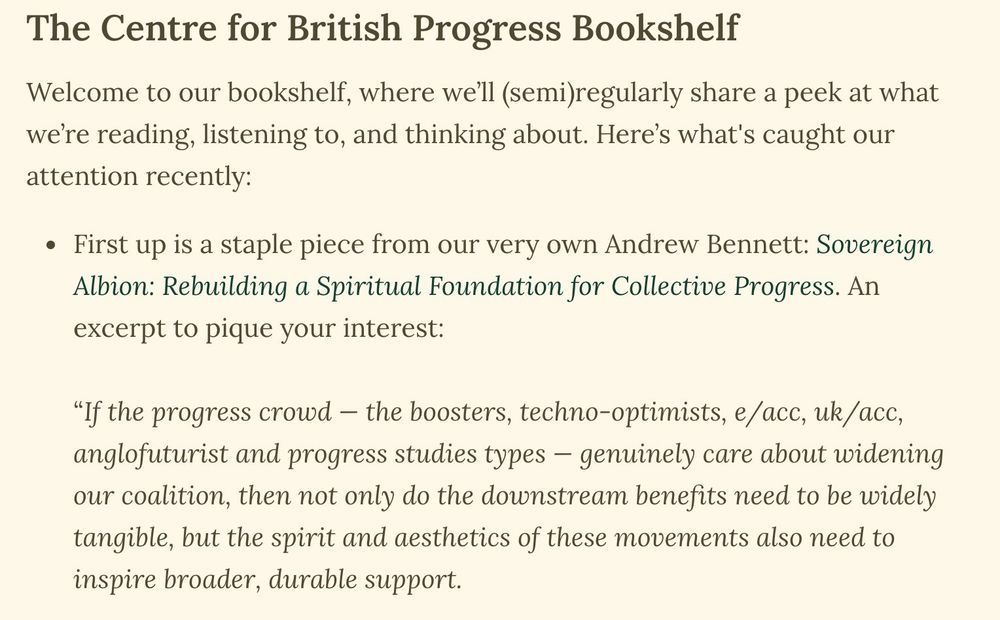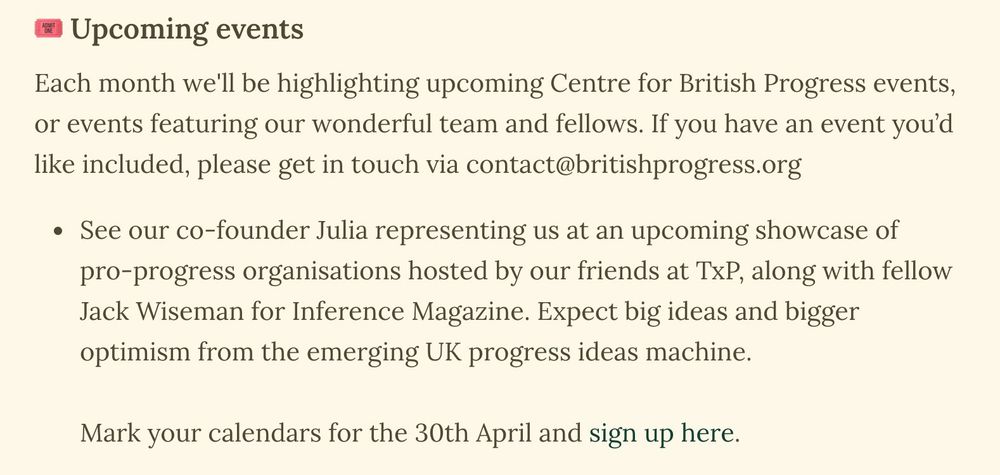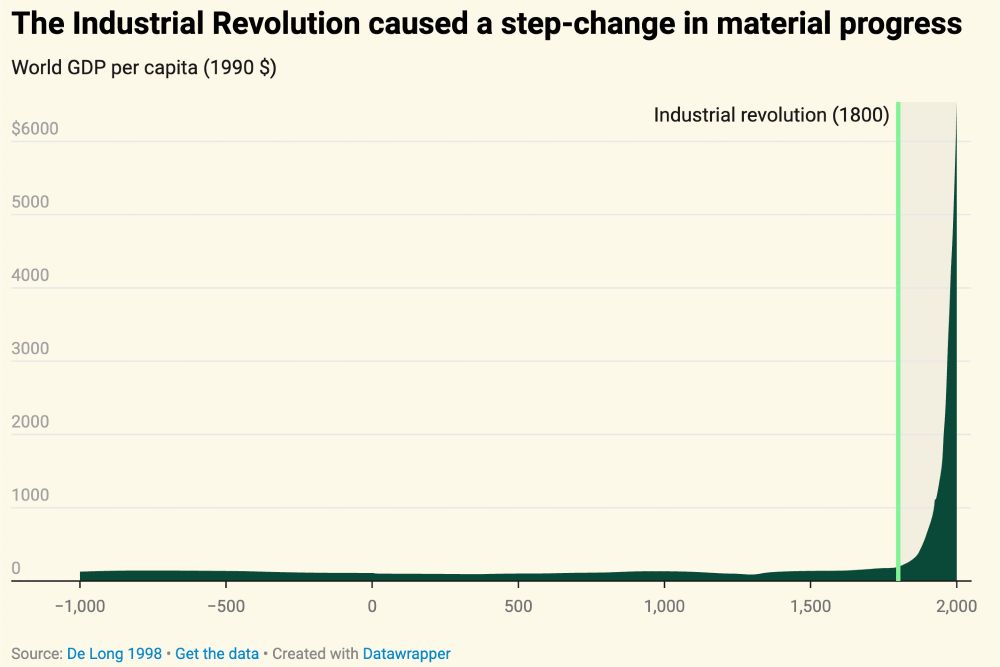
Centre for British Progress
@britishprogress.org
The Centre for British Progress is a non-partisan think tank on a mission to accelerate and shape an era of British growth and progress; evolved from @ukdayone.bsky.social.
Website: https://britishprogress.org/
Website: https://britishprogress.org/
Once you’ve read our launch essay, don’t miss out on a few of our team’s top recommendations:

April 14, 2025 at 3:10 PM
Once you’ve read our launch essay, don’t miss out on a few of our team’s top recommendations:
A date for your diaries: @jujulemons.bsky.social will be speaking at a TxP event on April 30th!

April 14, 2025 at 3:10 PM
A date for your diaries: @jujulemons.bsky.social will be speaking at a TxP event on April 30th!
It’s been a busy few weeks here, with our launch.
A massive thank you to everyone who helped us get this far, and to everyone who read, shared and commented on our essay.
A massive thank you to everyone who helped us get this far, and to everyone who read, shared and commented on our essay.

April 14, 2025 at 3:10 PM
It’s been a busy few weeks here, with our launch.
A massive thank you to everyone who helped us get this far, and to everyone who read, shared and commented on our essay.
A massive thank you to everyone who helped us get this far, and to everyone who read, shared and commented on our essay.
The Progress Post: our new substack
We'll look beyond policy to the cultural currents behind British progress, and the ideas, values, & visions that we're building towards.
Today: our April newsletter, upcoming events, & bookshelf with pieces from @droojb.bsky.social & Jack Wiseman
We'll look beyond policy to the cultural currents behind British progress, and the ideas, values, & visions that we're building towards.
Today: our April newsletter, upcoming events, & bookshelf with pieces from @droojb.bsky.social & Jack Wiseman

April 14, 2025 at 3:10 PM
The Progress Post: our new substack
We'll look beyond policy to the cultural currents behind British progress, and the ideas, values, & visions that we're building towards.
Today: our April newsletter, upcoming events, & bookshelf with pieces from @droojb.bsky.social & Jack Wiseman
We'll look beyond policy to the cultural currents behind British progress, and the ideas, values, & visions that we're building towards.
Today: our April newsletter, upcoming events, & bookshelf with pieces from @droojb.bsky.social & Jack Wiseman
Frustration with government is mounting across western countries, but we must resist the impulse to slash and burn.
The harder, but more courageous, route is one that brings people with us to build effective institutions that last.
The harder, but more courageous, route is one that brings people with us to build effective institutions that last.

April 3, 2025 at 7:52 AM
Frustration with government is mounting across western countries, but we must resist the impulse to slash and burn.
The harder, but more courageous, route is one that brings people with us to build effective institutions that last.
The harder, but more courageous, route is one that brings people with us to build effective institutions that last.
A better model of governance is possible.
Since its founding in 1958, the US’s DARPA has produced a steady stream of technological breakthroughs: from GPS to mRNA vaccines.
Not because of DARPA’s scale, but its structure: empowered program managers who make and own decisions.
Since its founding in 1958, the US’s DARPA has produced a steady stream of technological breakthroughs: from GPS to mRNA vaccines.
Not because of DARPA’s scale, but its structure: empowered program managers who make and own decisions.

April 3, 2025 at 7:52 AM
A better model of governance is possible.
Since its founding in 1958, the US’s DARPA has produced a steady stream of technological breakthroughs: from GPS to mRNA vaccines.
Not because of DARPA’s scale, but its structure: empowered program managers who make and own decisions.
Since its founding in 1958, the US’s DARPA has produced a steady stream of technological breakthroughs: from GPS to mRNA vaccines.
Not because of DARPA’s scale, but its structure: empowered program managers who make and own decisions.
Deeper than everythingism, our institutions lack agency.
Our machinery of governance has been tailored for consultation not decisive action. The Lower Thames crossing, finally approved, has spent years and £300m in planning.
A decision delayed and avoided and a road unbuilt.
Our machinery of governance has been tailored for consultation not decisive action. The Lower Thames crossing, finally approved, has spent years and £300m in planning.
A decision delayed and avoided and a road unbuilt.

April 3, 2025 at 7:52 AM
Deeper than everythingism, our institutions lack agency.
Our machinery of governance has been tailored for consultation not decisive action. The Lower Thames crossing, finally approved, has spent years and £300m in planning.
A decision delayed and avoided and a road unbuilt.
Our machinery of governance has been tailored for consultation not decisive action. The Lower Thames crossing, finally approved, has spent years and £300m in planning.
A decision delayed and avoided and a road unbuilt.
‘Everything bagel liberalism’ is pervasive.
A policy that sets out to achieve a single objective is laden with other worthy goals.
Every policy must now also be a vehicle to tackle all ills like decarbonisation or lack of access to community sports.
A policy that sets out to achieve a single objective is laden with other worthy goals.
Every policy must now also be a vehicle to tackle all ills like decarbonisation or lack of access to community sports.

April 3, 2025 at 7:52 AM
‘Everything bagel liberalism’ is pervasive.
A policy that sets out to achieve a single objective is laden with other worthy goals.
Every policy must now also be a vehicle to tackle all ills like decarbonisation or lack of access to community sports.
A policy that sets out to achieve a single objective is laden with other worthy goals.
Every policy must now also be a vehicle to tackle all ills like decarbonisation or lack of access to community sports.
This leaves Britain a high-wealth, low-income country.
We’re sweating assets left to us by previous generations, instead of building an endowment for the future.
We’re sweating assets left to us by previous generations, instead of building an endowment for the future.


April 3, 2025 at 7:52 AM
This leaves Britain a high-wealth, low-income country.
We’re sweating assets left to us by previous generations, instead of building an endowment for the future.
We’re sweating assets left to us by previous generations, instead of building an endowment for the future.
Building was once a national act of confidence.
We laid 6,000 miles of railway in a generation. We built sewers, town halls, reservoirs, and housing for the masses.
Today? We can't build a railway to the Midlands without cancelling it halfway through.
We laid 6,000 miles of railway in a generation. We built sewers, town halls, reservoirs, and housing for the masses.
Today? We can't build a railway to the Midlands without cancelling it halfway through.

April 3, 2025 at 7:52 AM
Building was once a national act of confidence.
We laid 6,000 miles of railway in a generation. We built sewers, town halls, reservoirs, and housing for the masses.
Today? We can't build a railway to the Midlands without cancelling it halfway through.
We laid 6,000 miles of railway in a generation. We built sewers, town halls, reservoirs, and housing for the masses.
Today? We can't build a railway to the Midlands without cancelling it halfway through.
This isn’t just a story of stalled infrastructure. It’s a story of values.
The Victorians didn’t just build fast. They built beautifully – and with pride.
Paddington. St Pancras. Temple Meads. Glasgow Central. Civic cathedrals in glass, steel and iron.
The Victorians didn’t just build fast. They built beautifully – and with pride.
Paddington. St Pancras. Temple Meads. Glasgow Central. Civic cathedrals in glass, steel and iron.


April 3, 2025 at 7:52 AM
This isn’t just a story of stalled infrastructure. It’s a story of values.
The Victorians didn’t just build fast. They built beautifully – and with pride.
Paddington. St Pancras. Temple Meads. Glasgow Central. Civic cathedrals in glass, steel and iron.
The Victorians didn’t just build fast. They built beautifully – and with pride.
Paddington. St Pancras. Temple Meads. Glasgow Central. Civic cathedrals in glass, steel and iron.
2️⃣Borrowing vs Building - Britain needs to invest in its future
We’re still using the roads, railways, pipes and public buildings laid down by the Victorians and the postwar state.
But we’ve forgotten how to build.
We’re still using the roads, railways, pipes and public buildings laid down by the Victorians and the postwar state.
But we’ve forgotten how to build.

April 3, 2025 at 7:52 AM
2️⃣Borrowing vs Building - Britain needs to invest in its future
We’re still using the roads, railways, pipes and public buildings laid down by the Victorians and the postwar state.
But we’ve forgotten how to build.
We’re still using the roads, railways, pipes and public buildings laid down by the Victorians and the postwar state.
But we’ve forgotten how to build.
The public sector needs dynamism too.
Progress needs an empowered state to build infrastructure, deploy tech, and deliver public services.
Britain once declared war on the “Five Giant Evils”.
Now, our crumbling public services are in desperate need of ambition.
Progress needs an empowered state to build infrastructure, deploy tech, and deliver public services.
Britain once declared war on the “Five Giant Evils”.
Now, our crumbling public services are in desperate need of ambition.

April 3, 2025 at 7:52 AM
The public sector needs dynamism too.
Progress needs an empowered state to build infrastructure, deploy tech, and deliver public services.
Britain once declared war on the “Five Giant Evils”.
Now, our crumbling public services are in desperate need of ambition.
Progress needs an empowered state to build infrastructure, deploy tech, and deliver public services.
Britain once declared war on the “Five Giant Evils”.
Now, our crumbling public services are in desperate need of ambition.
A conservative approach to regulation makes progress difficult or illegal. We ban delivery robots because of a law passed in 1835.
Dynamism needs not only ambition, but a willingness to make mistakes and try again.
Dynamism needs not only ambition, but a willingness to make mistakes and try again.

April 3, 2025 at 7:52 AM
A conservative approach to regulation makes progress difficult or illegal. We ban delivery robots because of a law passed in 1835.
Dynamism needs not only ambition, but a willingness to make mistakes and try again.
Dynamism needs not only ambition, but a willingness to make mistakes and try again.
Britain innovates well, but adopts slowly.
The UK scores much lower than other countries on measures of tech adoption and diffusion.
We fail to make use of the technologies we invent, contributing to low productivity.
The UK scores much lower than other countries on measures of tech adoption and diffusion.
We fail to make use of the technologies we invent, contributing to low productivity.


April 3, 2025 at 7:52 AM
Britain innovates well, but adopts slowly.
The UK scores much lower than other countries on measures of tech adoption and diffusion.
We fail to make use of the technologies we invent, contributing to low productivity.
The UK scores much lower than other countries on measures of tech adoption and diffusion.
We fail to make use of the technologies we invent, contributing to low productivity.
Britain pioneered nuclear power: we built the world's first grid scale plant.
Now, Hinkley Point C could be one of the most expensive ever built.
British SMRs could power our next wave of growth, but outdated and overcautious regulators risk driving firms elsewhere.
Now, Hinkley Point C could be one of the most expensive ever built.
British SMRs could power our next wave of growth, but outdated and overcautious regulators risk driving firms elsewhere.

April 3, 2025 at 7:52 AM
Britain pioneered nuclear power: we built the world's first grid scale plant.
Now, Hinkley Point C could be one of the most expensive ever built.
British SMRs could power our next wave of growth, but outdated and overcautious regulators risk driving firms elsewhere.
Now, Hinkley Point C could be one of the most expensive ever built.
British SMRs could power our next wave of growth, but outdated and overcautious regulators risk driving firms elsewhere.
Today’s trillion-dollar ‘superstar’ firms were mostly founded in the US, not the EU or UK.
Many of these emerged in the last fifty years and took on incumbents, driving technological progress.
Meanwhile, the EU and UK have spent their energy regulating and blocking larger firms.
Many of these emerged in the last fifty years and took on incumbents, driving technological progress.
Meanwhile, the EU and UK have spent their energy regulating and blocking larger firms.

April 3, 2025 at 7:52 AM
Today’s trillion-dollar ‘superstar’ firms were mostly founded in the US, not the EU or UK.
Many of these emerged in the last fifty years and took on incumbents, driving technological progress.
Meanwhile, the EU and UK have spent their energy regulating and blocking larger firms.
Many of these emerged in the last fifty years and took on incumbents, driving technological progress.
Meanwhile, the EU and UK have spent their energy regulating and blocking larger firms.
1️⃣ Conservatism vs Dynamism: our institutions encourage caution & stifle entrepreneurship
🛑 Firms underinvest
🛑 Regulation protects incumbents
🛑 Merger rules discourage successful firms
We once built a global telegraph network. Today, delivery robots are banned.
🛑 Firms underinvest
🛑 Regulation protects incumbents
🛑 Merger rules discourage successful firms
We once built a global telegraph network. Today, delivery robots are banned.

April 3, 2025 at 7:52 AM
1️⃣ Conservatism vs Dynamism: our institutions encourage caution & stifle entrepreneurship
🛑 Firms underinvest
🛑 Regulation protects incumbents
🛑 Merger rules discourage successful firms
We once built a global telegraph network. Today, delivery robots are banned.
🛑 Firms underinvest
🛑 Regulation protects incumbents
🛑 Merger rules discourage successful firms
We once built a global telegraph network. Today, delivery robots are banned.
This isn’t just an economic problem. Slow growth means less money for public services.
It means overcrowded classrooms, lengthening NHS waiting lists, and children hungry at school.
It means overcrowded classrooms, lengthening NHS waiting lists, and children hungry at school.

April 3, 2025 at 7:52 AM
This isn’t just an economic problem. Slow growth means less money for public services.
It means overcrowded classrooms, lengthening NHS waiting lists, and children hungry at school.
It means overcrowded classrooms, lengthening NHS waiting lists, and children hungry at school.
We are not just growing slowly; we’re falling behind.
Since ‘08, Britain’s growth has lagged behind its peers’ dramatically.
Families are 19% poorer than they would be if pre-2008 trends had continued – equivalent to £7,000 being lost per household.
Since ‘08, Britain’s growth has lagged behind its peers’ dramatically.
Families are 19% poorer than they would be if pre-2008 trends had continued – equivalent to £7,000 being lost per household.

April 3, 2025 at 7:52 AM
We are not just growing slowly; we’re falling behind.
Since ‘08, Britain’s growth has lagged behind its peers’ dramatically.
Families are 19% poorer than they would be if pre-2008 trends had continued – equivalent to £7,000 being lost per household.
Since ‘08, Britain’s growth has lagged behind its peers’ dramatically.
Families are 19% poorer than they would be if pre-2008 trends had continued – equivalent to £7,000 being lost per household.
British progress has faltered.
📉Wages flatlined
📉Productivity stalled
📉Public services buckling under pressure
And for the first time in living memory, our children are expected to be poorer than their parents.
📉Wages flatlined
📉Productivity stalled
📉Public services buckling under pressure
And for the first time in living memory, our children are expected to be poorer than their parents.

April 3, 2025 at 7:52 AM
British progress has faltered.
📉Wages flatlined
📉Productivity stalled
📉Public services buckling under pressure
And for the first time in living memory, our children are expected to be poorer than their parents.
📉Wages flatlined
📉Productivity stalled
📉Public services buckling under pressure
And for the first time in living memory, our children are expected to be poorer than their parents.
Human progress depends upon material advancement.
Britain’s industrialisation sparked massive leaps in living standards, shaping the modern world.
Today, Britain has stagnated, and has lost control of its economic destiny. We must rediscover our ability to progress.
Britain’s industrialisation sparked massive leaps in living standards, shaping the modern world.
Today, Britain has stagnated, and has lost control of its economic destiny. We must rediscover our ability to progress.

April 3, 2025 at 7:52 AM
Human progress depends upon material advancement.
Britain’s industrialisation sparked massive leaps in living standards, shaping the modern world.
Today, Britain has stagnated, and has lost control of its economic destiny. We must rediscover our ability to progress.
Britain’s industrialisation sparked massive leaps in living standards, shaping the modern world.
Today, Britain has stagnated, and has lost control of its economic destiny. We must rediscover our ability to progress.
The postcard is not just a story of technological progress. It’s one of state capacity.
At the time, the Post Office was the world’s most advanced civil logistics network. Tech, growth, and the state together drove progress.
Somewhere along the way, we forgot this formula.
At the time, the Post Office was the world’s most advanced civil logistics network. Tech, growth, and the state together drove progress.
Somewhere along the way, we forgot this formula.

April 3, 2025 at 7:52 AM
The postcard is not just a story of technological progress. It’s one of state capacity.
At the time, the Post Office was the world’s most advanced civil logistics network. Tech, growth, and the state together drove progress.
Somewhere along the way, we forgot this formula.
At the time, the Post Office was the world’s most advanced civil logistics network. Tech, growth, and the state together drove progress.
Somewhere along the way, we forgot this formula.
Suddenly communication was within almost everyone’s grasp.
Businesses connected nationwide. Families could keep in touch. Crucially: people began to organise.
Unions and suffrage movements mobilised via this revolutionary and affordable medium, catalysing social progress.
Businesses connected nationwide. Families could keep in touch. Crucially: people began to organise.
Unions and suffrage movements mobilised via this revolutionary and affordable medium, catalysing social progress.

April 3, 2025 at 7:52 AM
Suddenly communication was within almost everyone’s grasp.
Businesses connected nationwide. Families could keep in touch. Crucially: people began to organise.
Unions and suffrage movements mobilised via this revolutionary and affordable medium, catalysing social progress.
Businesses connected nationwide. Families could keep in touch. Crucially: people began to organise.
Unions and suffrage movements mobilised via this revolutionary and affordable medium, catalysing social progress.
Britain’s industrial and scientific revolution was not just marked by Brunel’s bridges and Stephenson’s steam engine.
Before 1870, post was eyewateringly expensive, beyond the reach of almost all ordinary people.
But the humble, pre-paid, halfpenny postcard changed everything.
Before 1870, post was eyewateringly expensive, beyond the reach of almost all ordinary people.
But the humble, pre-paid, halfpenny postcard changed everything.

April 3, 2025 at 7:52 AM
Britain’s industrial and scientific revolution was not just marked by Brunel’s bridges and Stephenson’s steam engine.
Before 1870, post was eyewateringly expensive, beyond the reach of almost all ordinary people.
But the humble, pre-paid, halfpenny postcard changed everything.
Before 1870, post was eyewateringly expensive, beyond the reach of almost all ordinary people.
But the humble, pre-paid, halfpenny postcard changed everything.

